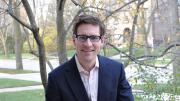Ethan Lasser will join the Harvard Art Museums’ division of European and American art as Winthrop associate curator of American art, effective September 18, the University has announced.
Thomas W. Lentz, director of the Harvard Art Museums, says Lasser’s background in teaching students using objects—one of the curricular goals of the museum once it is reopened—makes him a timely addition to the curatorial team during a “pivotal period” of growth for the museums. “He is already establishing his presence, contributing work on the plans for the reinstallation of the American collection in the galleries of our new facility,” Lentz said.
The Fogg—slated to reopen in 2014—and Busch-Reisinger museums hold over 70,000 drawings, paintings, photographs, prints, sculptures, and objects of decorative art dating from the twelfth century to 1900 in the division of European and American art. The collection of American art is best known for colonial- and federal-period painting, and late nineteenth-century pieces, including works by John Singleton Copley, Winslow Homer, John Singer Sargent, and James Abbott McNeill Whistler.
Stephan Wolohojian, head of the division of European and American art and Clay curator, said Lasser’s fresh perspective on American art as well as his close engagement with objects will align well with the museum’s mission: “Ethan will do a great job working with students and presenting Harvard’s holdings to broader audiences.”
Previously, Lasser has been curator of the Chipstone Foundation in Milwaukee, Wisconsin—a research institute committed to advancing progressive scholarship in American art through exhibitions, publications, teaching, and public programming. In 2008, he reinstalled the foundation’s permanent galleries at the Milwaukee Art Museum, a 13,000-square-foot exhibition space for American paintings and decorative arts. He has also served as adjunct professor in the department of art History at the University of Wisconsin–Madison.
In Madison he initiated the Object Lab, a summer program for undergraduates focused on teaching American art and craft history through hands-on research with artifacts. A Williams College graduate with a Ph.D. in art history from Yale, Lasser is currently developing two new exhibitions—“The Practice and Poetics of Repair” and “Makers: Craft and Industry in American Art”—both of which explore his interest in art-making processes and materiality.
Lasser says he is “thrilled” to be joining the museums, and is “looking forward to working with my new colleagues and all of the museums’ supporters to develop an innovative American art program that will capture the attention of students, faculty, and the community at large.”









